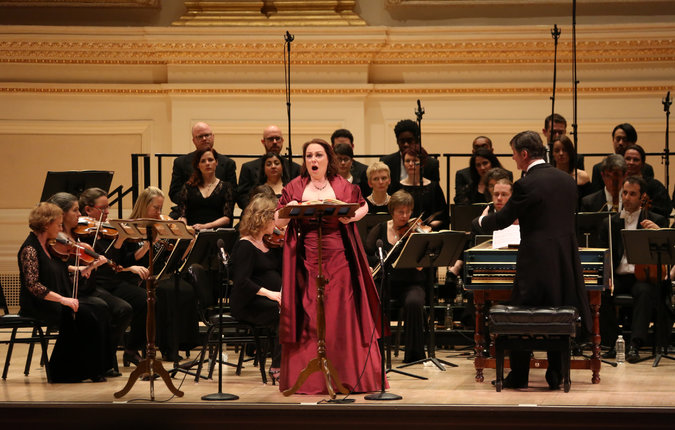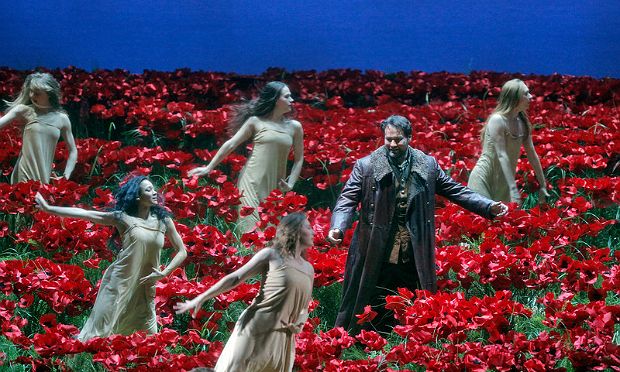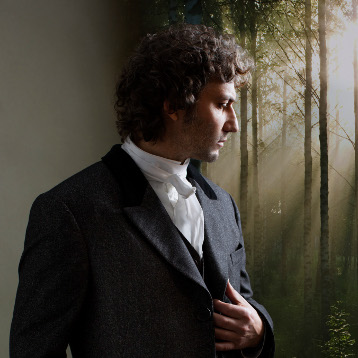
If you think the customer is always right, you might have believed the audience members who booed the production team of the new Robert Carsen “Der Rosenkavalier” that premiered at the Metropolitan Opera several weeks ago. But you would have been dead wrong. I saw it last Friday, and it’s a breath of fresh air.
Carsen has tossed aside the powdered wigs and knee breeches and set the opera in the year of its premiere, 1911. His take on this Richard Strauss-Hugo von Hofmannsthal masterpiece is a marvel of detail, so much so that I plan to attend the Live in HD telecast in two weeks just to catch some business I might have missed. It’s spot-on to see the egotistical Italian tenor (a terrific Matthew Polenzani) present the Marschallin with a 78 rpm recording of his latest hit, which he proceeds to autograph for her with a flourish. And in an uproarious Act III, how can anyone be surprised that the band showing up to serenade Ochs and Mariandel is clearly Sweet Sue and Her Society Syncopaters from “Some Like It Hot,” complete with sax and bass. (I know that’s the 1920’s, but if Strauss can write an 18th century opera replete with three-quarter time though the waltz wouldn’t be invented until decades later, anachronism becomes the norm). I could go on, but I don’t want to give away all the incidentals that make this production such fun.
As sharply observed as this production is, it wouldn’t have the impact it enjoys without its cast. Much publicity has surrounded Renée Fleming’s final appearances as the Marschallin, and while I can’t say that her voice retains all the luster it once possessed, dramatically speaking she’s grown enormously in the role. Years ago I saw one of her first Marschallins at the Met, and she seemed somewhat intimidated by the part. In Carsen’s production she easily achieves what all good Marschallins must—she holds the audience throughout the levée, her monologue and the following scene with Octavian, and captures the bittersweet ending of Act I perfectly. Yet her final exit in Act III, on the arm of the Feldmarschall’s “brave orderly,” after a not-quite covert glance or two, reminds us that Octavian wasn’t her first lover, and certainly won’t be her last.
(A propos of absolutely nothing, what do Marschallins do when they’re off-stage during Act II and the first half of Act III? Play cards with the stage hands? Take a snooze? Maybe Ms. Fleming will spill the beans during the HD telecast intermission).
Elina Garança is a phenomenal Octavian. She certainly makes a gorgeous guy and her voice is lovely, but the uniqueness of her portrayal rests on her vivid embodiment of the 17 year-old boy he’s supposed to be. The petulance and impetuosity are there, but her Octavian is slightly more deferential to his lover than most, and his departure at the end of Act I is done not so much out of anger as of befuddled sorrow. Garança hints at his growing knowledge that his affair with a married woman really can’t go anywhere, yet she still manages to convince us that his love for Sophie is not just a matter of falling for the first pretty face he sees. She plays the comedy very well—her “Victor/Victoria” in Act III (the trick of a woman pretending to be a man pretending to be a woman) is flawless.

Because Baron Ochs is usually played as a fat fool, you tend to forget that Strauss and von Hoffmannsthal had something else in mind. Günther Groissböck portrays him as the 35-year old bachelor he was conceived to be, and it’s wonderfully refreshing to see a young, attractive bass in the role. This Ochs may be an idiot over Mariandel, but he’s no fool. His harping on “die Marschallin…Octavian…Mariandel” in Act III poses a real threat, and it’s only when the Marschallin doesn’t flinch that he gives in to her insistence that he depart the field.
Unfortunately the performance I saw was missing the excellent Sophie of Erin Morley, but she’s due to return shortly and will be on hand for the live telecast on May 13 that will also feature Ms. Fleming’s last ever Marschallin as well as Ms. Garança’s final Octavian (she’s headed for the more dramatic flair of Amneris, Santuzza and Dalila).
The score and libretto of “Der Rosenkavalier” are among the finest in the literature. But Robert Carsen’s production also reminds us what superb theater this work can (and should) always be. Bravo!
________________________________
It was a double-header weekend for me. Yesterday I attended a concert performance of Handel’s “Ariodante” at Carnegie Hall that was simulcast on Medici TV. The entire opera will be viewable on the Carnegie Hall website for the next 90 days, and if you’d like to hear what perfection sounds like, cue the webcast at 1:10:30 for Joyce DiDonato’s “Scherza infida,” accompanied by Harry Bicket and The English Concert. Time stands still.



